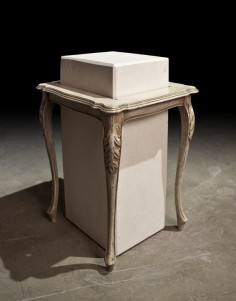Aslı Çavuşoğlu
Murder in Three Acts
source: turkishcultureorg
Aslı Çavuşoğlu was born in Istanbul in 1982. She graduated from the Department of Cinema and Television at Marmara University in 2004. Currently, she lives and works between Istanbul, Mexico City, and Gerogetown (USA). Much of Çavuşoğlu’s work stems from experimental narrative exercises working around mechanisms of erasure, repetition, replication and narrative interplay. She creates her art using various media, including artists′ books, videos, photography and installations. Çavuşoğlu has also produced several artists’ books, including Takip / Poursuite (2006), Caiet De Geografie (2006), The Unsubscribed Life of Peter Böse (2007), and In Patagonia after Bruce Chatwin (2009). In addition, she has acted as a guest editor for Pist Protta magazine (Copenhagen) and published numerous articles and essays in publications including Pazmaker and Artlies. She has had many exhibitions in Turkey and abroad. Cavuşoğlu won the grand prize of the Full Art Prize 2012, which was the first contemporary art prize of Turkey.
.
.
.
.
.
.
.
source: galerinon
Aslı Çavuşoğlu (b. 1982, lives and works in Istanbul) is an artist concerned with how history can be read so as to question who, or what processes, enabled its writing and toward what end. These investigations, which have been articulated through the means of various media, revisit key moments so as to locate the intertwined dance between rupture and continuity as consciousness and its related identities are constructed, and reconstructed.
Her recent film, In Diverse Estimations Little Moscow, 2011, shot in and with the residents of the small Turkish town of Fatsa on the Black Sea, sought to visit not only the town’s recent past—after establishing a collectivist government, the Turkish National Army lead a successful operation to retake the town, an operation which served as a test run for the Army’s eventual Coup d’etate and establishment of a Turkish Dictatorship 3 months later in 1980—but also to trace the degree of transformation in that location today as, for example, a factory repurposed by the army for use as an interrogation and torture facility is now an abandoned, if not forgotten, hall of the local University. Just as in this film, Çavuşoğlu’s work seeks to collect and look at incidents and fragments that often get deposited in and lost through the formation of dominant narratives.
Currently, she is turning her eye to the subject of the Turkish Modernization Period from the late 19th C., specifically, how the desire to westernize and its related rhetoric accelerated the establishment of the Turkish Republic in 1923, while also producing a state of amnesia as the population turned its back not only on the recent past typified by the decline of the Ottoman Empire and its customs, but also the rejection of its alphabet as well—thus making its historical archives illegible.
Recent group exhibitions include: Frieze Projects, London, 2012; The 11th Baltic Triennial of International Art, curated by Defne Ayas and Benjamin Cook, Vilnius, 2012; Turkish Art Nice and Superb, curated by Rene Block, TANAS, Berlin, 2012; Soundworks, curated by Anna Gritz, ICA, London, 2012; Performa11 NY, USA, 2011; Seven New Works, Borusan Contemporary, Perili Köşk, Istanbul, 2011; We Have Woven The Motherlands With Nets of Iron, Giza Hejaz Railway Station, Amman, 2011; Who Do You Admire?, La Box, Ecole Nationale Superieure D’artbourges, Bourges, FR, 2011; Transient Spaces – The Tourist Syndrome, Neue Gesellschaft für Bildende Kunst, Berlin, Germany, 2010;When Ideas Become Crime, DEPO, Istanbul, Turkey, 2010; Voices From Silence – Truths Unveiled By Time, Galerie Obdahl, Berlin, Germany, 2010; Fantasy & Island, FRAC Corse, Corsica, France, 2010; This Place You See Has No Size At All, Kadist Art Foundation, Paris, France, 2009; Everyday Challengers, Hisk, Gent, Belgium, 2009; Interferencia, Bogota, Colombia, 2009; Kein Ding, ACC Galerie, Weimar, Germany, 2009; End Game, Galery Loop, Seoul, Korea, 2009.


